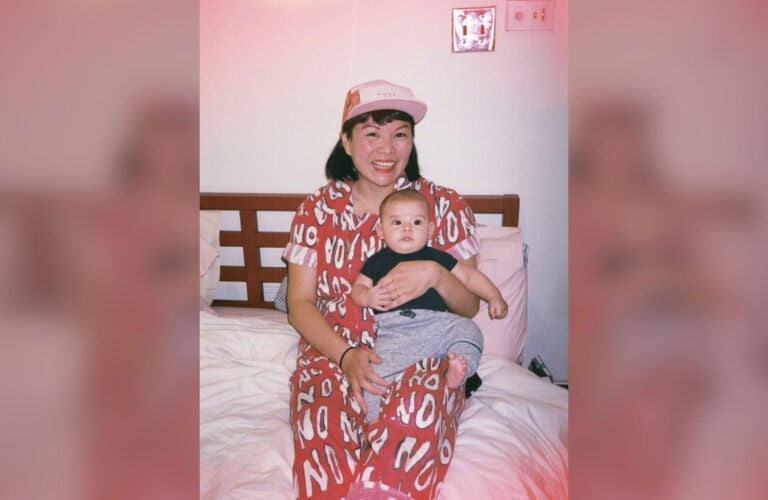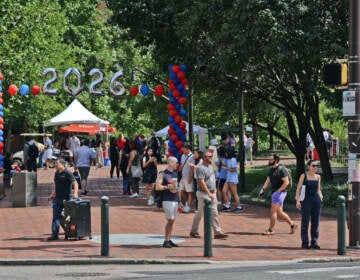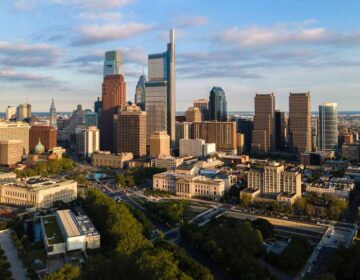‘If we take that pressure out of it one day, it will feel more like a hug:’ North Chinatown arts collective struggles in the COVID-19 economy
Morning Edition host Jennifer Lynn speaks with Anne Ishii, director of Asian Arts Initiative, whose business has struggled during the COVID-19 pandemic.
Listen 6:36
Anne Ishii, executive director of Asian Arts Initiative with her son, Dario. (Christian Galuppi)
Are you on the front lines of the coronavirus? Help us report on the pandemic.
For decades, a vibrant arts collective in North Chinatown has served a community at large by showcasing the works of Asian Americans.
But now Philadelphia’s Asian Arts Initiative, like so many nonprofits, is taking a crushing hit in the COVID-19 economy.
Executive Director Anne Ishii works from home these days, her toddler son, Dario, nearby.
Due to the stay-at-home order, Ishii’s plan to have Dario run around in the park and meet other kids this spring is upended.
And it’s been harder than ever to keep AAI running, with revenue streams disrupted.
Spend more time with Ishii and the conversation turns toward another upset for the community: Anti-Asian bias rooted in fear.
I spoke with Ishii earlier this week hours after AAI lost a grant from the city.
___
These days, I start with the latest tragedy, the latest hit. So for us, that was finding out this weekend that the mayor has announced they’re eliminating the Office of Arts, Culture and Creative Economy, which houses the funding that we get from the Philadelphia Cultural Fund. That’s the most recent thing that we’ve just been hit with.
You also, on the other hand, are in line for one of these small business loans.
We’re told that we’ve been approved of a loan, at least one loan, and have been told to wait on standby with some pretty strong assumptions about our qualification for other things. So that’s been really good news.
Now, in your emails to supporters of your organization, you’re giving these updates on how the money is coming in, and the money is not coming in, which is very important to folks. You also include a link to an organization called Asian Americans Advancing Justice. And I checked it out. It lists these examples of how Asian Americans are being treated around the country during the pandemic, and there’s some real eye-opening stuff.
This is kind of a gross way of thinking about it. But on the spectrum, at the lower end, that’s sort of just mild harassment and being called horrible things. And that’s truly awful. The impact of that can’t be understated. And I’ve shared this anecdote before, but it’s not just if you’re the victim of it, but if you’re witnessing it as an Asian person and feeling helpless to — being unable to — respond to it in the moment. And I think for a lot of people for whom English is a second language, that’s especially frustrating. But there’s that added complexity of a lot of our — we have a really strong, rich, robust Southeast Asian community here, comprised mostly of immigrant and first-, second-generation families who have really long histories of near-death trauma. So to negotiate between something that puts your life at risk against what might in your mind be perceived as, quote, “not a big deal.” I think it’s really hard to gauge how that trauma affects us differently as a trigger, for example.
What does this insensitivity do to you, to Anne Ishii? You grew up in Los Angeles in the 80s, at a time when there was a growing anti-Japanese hatred during a Japanese business boom.
Today, I live in the spirit of trying to own some of the privilege I’ve accessed becoming a leader in the arts in the fifth biggest city in the country. So that feels like a position of privilege now. But I also take all of this baggage, if you will, and the memory of being bullied specifically for being Japanese. And that’s not lost on me. The irony of now trying to coalesce as an Asian American community at large to protect the people who racists think are the source of this illness.
How does this coronavirus story end? How might things be whole again?
Right now, we’re so busy on the frontline just making sure everybody’s safe. So it’s really hard to see the end of it. But the arts, I think, again, just to sort of assume the privilege that we have, can very joyously be a diversion and a distraction. And when it can be that — and maybe shed some of the gravity of it having to have social impact and contribute to this major social force in opposition to this humongous crisis — if we take that pressure out of it one day, it will feel more like a hug.
Well, thanks for your time and I wish you and the organization a lot of health and well-being.
Thanks, Jennifer. I really appreciate having this opportunity to chat.
WHYY is your source for fact-based, in-depth journalism and information. As a nonprofit organization, we rely on financial support from readers like you. Please give today.




![CoronavirusPandemic_1024x512[1]](https://whyy.org/wp-content/uploads/2020/03/CoronavirusPandemic_1024x5121-300x150.jpg)


